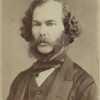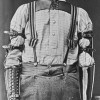
Scott C. Thompson, “On G. H. Lewes’s Problems of Life and Mind, 1874—79″
In Problems of Life and Mind (1874—79), George Henry Lewes posits his theory of “Scientific psychology,” which is founded on a synthesis between the objective study of the mind practiced in physiology and the subjective study of consciousness practiced in philosophy. Problems is an important text because it is one of the last quintessentially “Victorian” studies, a wide-ranging work produced before the full establishment of disciplinary boundaries. It combines a variety of discourses—including philosophy, physiology, psychology, evolutionary biology, and sociology—in order to establish a comprehensive methodology for the scientific study of consciousness. This entry positions Problems into its nineteenth-century psychological and philosophical tradition, as understood by Lewes; provides a summary of the overarching argument of Problems; and outlines the contributing sub-claims made in each of its discrete series.

Sue Zemka, “1822, 1845, 1869, 1893, and 1917: Artificial Hands”
The manufacture of artificial limbs was a Victorian growth industry, requiring an assortment of qualifications: mechanical skills, sympathy for the disabled, commercial ambition, a willingness to exaggerate in advertising, and faith in technological progress. This essay explores nineteenth-century designs for artificial hands, focusing on the stories they relay about the relationships between the people who needed artificial hands and the people who made them. These relationships concertize and personalize the complex factors at play in the history of Victorian hand prostheses: philosophies of embodiment, the hand’s role in these philosophies, the experiences of people without a hand or hands, and the impact of technology on all three.
